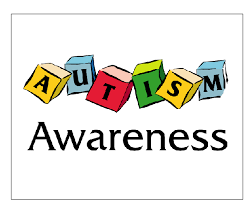April is Autism Awareness Month
April 7, 2016

Autism Spectrum Disorder (ASD) is a neurodevelopmental disorder that impacts social communication and behavior. Children with ASD may have difficulty talking with family and peers. For instance, they may be overly focused on a topic that is not of interest to others, and their conversation may lack a back-and-forth quality. Nonverbal language, including eye contact and gestures, may also be problematic. Children with ASD may have difficulty picking up on social cues. Additionally, their play may lack imagination. Repetitive behaviors, such as flailing of arms, may be exhibited. Children with ASD tend to enjoy routines, and may have difficulty adjusting to changes in their schedule. An additional feature often seen in children with ASD is oversensitivity to sounds (e.g., fire drills at school), touch (e.g., elastic bands in clothing), and smell (e.g., difficulty eating in the cafeteria due to the odors).
Assessment for Autism Spectrum Disorder will include tests specifically designed to measure areas of social communication and restrictive interests/behaviors. Both the child and parents are involved in the evaluation process. Cognitive functioning (e.g., intelligence and academic testing) is often included, as well as a language assessment. There is a wide range of functioning among individuals with ASD. Test results will highlight strengths as well as weaknesses.
Interventions for Autism Spectrum Disorder can be provided within the home, school, or private offices. The treatment team may include a psychologist, speech/language therapist, and occupational therapist to target the relevant areas of functioning. Early intervention can be very helpful. Even when a diagnosis is made later, most children with ASD will improve with the right combination of treatments.